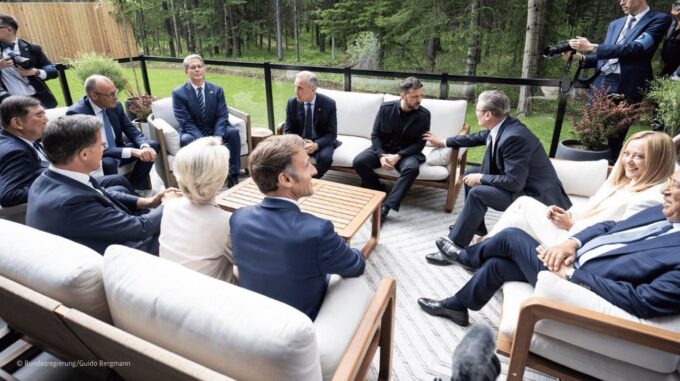Merkel and Macron call on world leaders to increase pressure on Russia amidst new challenges on the front of the war

Following the completion of the G7 summit in Canada, influential politicians – German Chancellor Olaf Scholz and French President Emmanuel Macron – hurried to issue a joint statement regarding the need to tighten sanctions against Russia. Their words and gestures sent a clear message: the international community needs to intensify its efforts to force Moscow to cease aggression and enable Ukraine to exit the war with minimal losses. On their personal social media accounts on X (formerly Twitter), Merkel and Macron shared brief but significant statements, making it clear that a decision has been made and that it depends on the resolve of the global community and political will. German Chancellor Olaf Scholz, commenting on the summit results, emphasized that he returns home with “cautious optimism” regarding the United States’ decision to implement a new round of sanctions against Moscow. According to Scholz, this step should serve as a strong signal to the Kremlin and increase international pressure, since, in his words, “the ball is now in Moscow’s court.” The politician stressed the necessity of doing everything possible to swiftly bring an end to Russian aggression: “We know it is time to act, and we call for the fastest and most decisive actions in this direction.” Meanwhile, French President Emmanuel Macron highlighted the importance of solidarity and a firm stance in supporting Ukraine. This was confirmed during his meeting with Ukrainian President Volodymyr Zelensky. Macron emphasized that France and its allies within the G7 are determined to intensify pressure on the Russian regime. In his speech, he pointed out that the aggressor country continues to victimize Ukraine’s civilian population; last night, large-scale missile strikes were recorded, further confirming the need for a more active international response. Macron stated that Ukraine is prepared for any scenario and is persistently committed to achieving peace. “We call on Russia to agree to an immediate and unconditional ceasefire. It must understand that its actions influence not only Ukraine’s situation but also global stability,” the French leader said. What preceded these calls? Participants of the Canadian summit received an important message from Ukrainian President Volodymyr Zelensky. In his address, he pointed out that the potential of the United States and other Western countries can be harnessed to compel Russia to halt this bloodshed war. Zelensky emphasized that negotiations with Russia remain relevant, but currently, it is crucial to apply the full range of diplomatic and sanctions tools. In this context, the Ukrainian leader particularly highlighted the role of Donald Trump: “We believe that cooperation with former President Donald Trump can create more effective conditions for exerting pressure on Moscow, and we urge working in this direction.” In summary, the participants of the Canadian summit decided to intensify efforts to impose significant sanctions aimed at changing Russia’s behavior. This is not only a diplomatic message but also a signal to Moscow that the world no longer intends to watch its aggression in silence and will act decisively to halt any new wave of war as quickly as possible. Optimism regarding the potential application of global mechanisms of pressure and diplomatic measures against the Kremlin is growing, but the actions of the international community remain key to overcoming the challenges faced by Ukraine and the world in this crisis situation.

